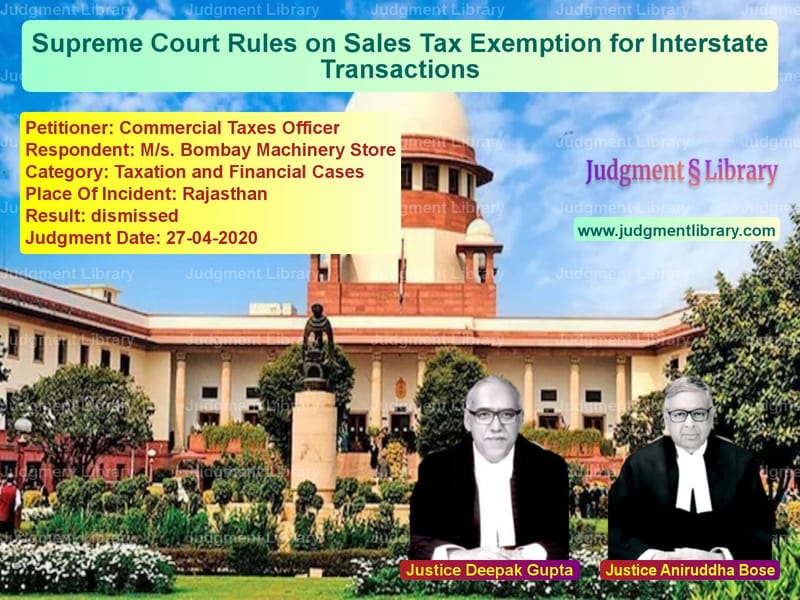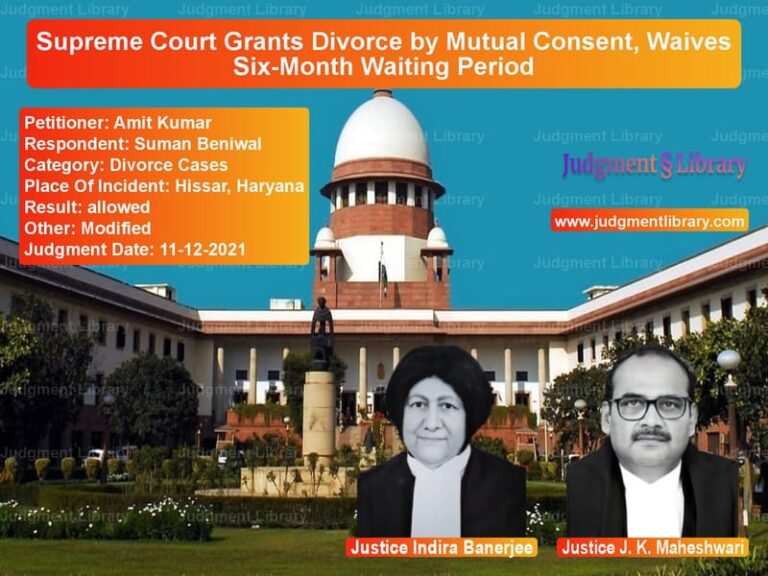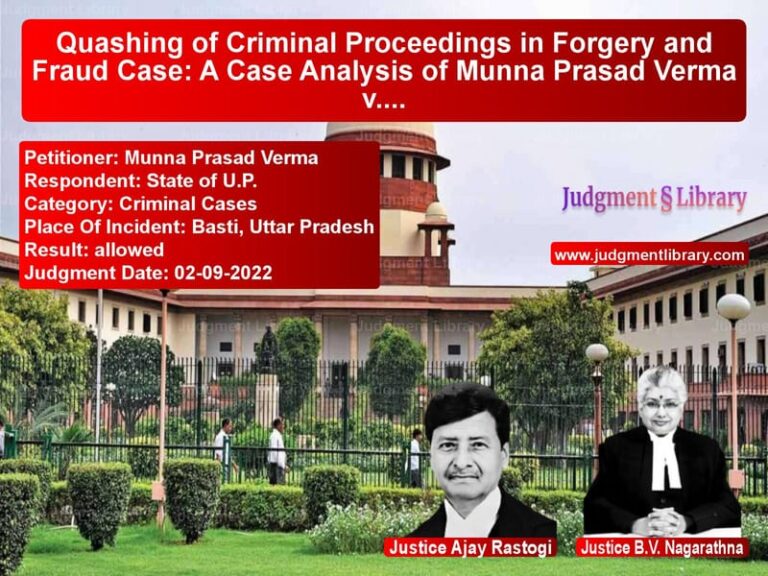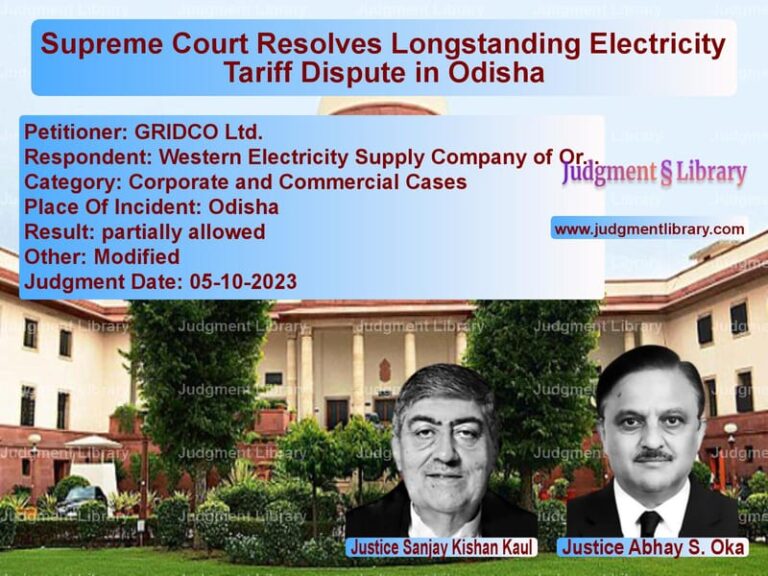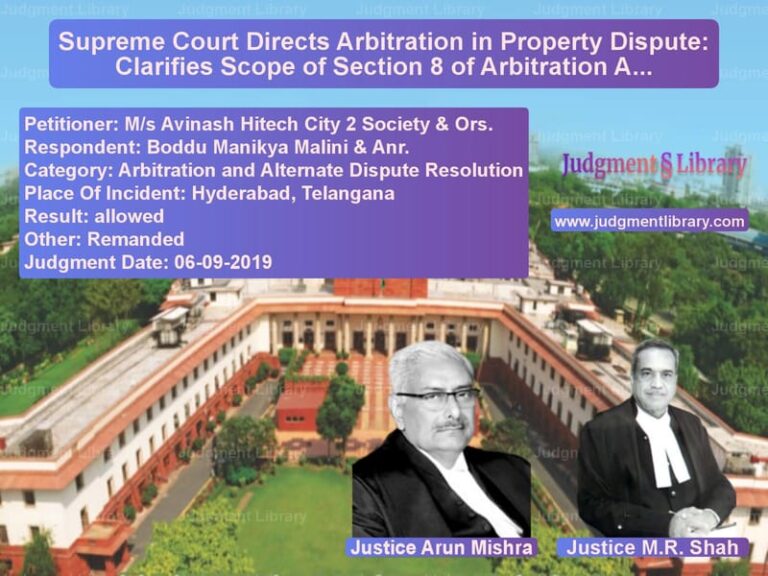Supreme Court Rules on Sales Tax Exemption for Interstate Transactions
The Supreme Court of India, in its judgment in Commercial Taxes Officer vs. M/s. Bombay Machinery Store, has provided clarity on the interpretation of Section 6(2) of the Central Sales Tax Act, 1956. The case addressed whether tax authorities could impose a time limit for claiming sales tax exemption on goods in transit. The ruling has significant implications for interstate trade and taxation.
Background of the Case
The respondent, M/s. Bombay Machinery Store, purchased goods from outside the state and subsequently sold them to local buyers in Rajasthan while the goods were still in transit. The sales were made through the transfer of documents of title to the goods, qualifying for tax exemption under Section 6(2) of the Central Sales Tax Act, 1956.
The Rajasthan Commercial Tax Department, however, contended that since the goods remained in the transport company’s godown for over a month before being sold, the sale should be treated as a local sale and taxed under the Rajasthan Sales Tax Act, 1954.
On appeal, the Rajasthan Tax Board ruled in favor of the assessee, allowing tax exemption under Section 6(2). The High Court upheld this decision and further quashed two circulars issued by the Commercial Taxes Department that imposed a time limit for claiming the exemption.
The department appealed to the Supreme Court, challenging the High Court’s ruling.
Key Legal Issues Raised
- Can tax authorities impose a time limit on the retention of goods in transit to determine sales tax exemption eligibility?
- Does constructive delivery of goods at a transport company’s godown nullify the exemption under Section 6(2)?
- Were the two circulars issued by the Rajasthan Commercial Taxes Department legally valid?
Arguments by the Appellant (Commercial Taxes Officer)
The department argued:
- The goods were not in continuous transit but were stored in the transport company’s godown for an extended period.
- By holding the goods for over a month, the consignee had effectively taken constructive delivery, terminating the movement of goods.
- The exemption under Section 6(2) applies only to transactions where goods remain in transit without constructive or physical delivery.
- The circulars issued by the department were necessary to curb tax evasion and ensure uniform application of the law.
Arguments by the Respondent (M/s. Bombay Machinery Store)
The respondent countered:
- The sales were executed by the transfer of documents of title while the goods were still with the transport company.
- There was no law specifying a time limit for claiming the exemption under Section 6(2).
- The Rajasthan Commercial Taxes Department’s circulars were beyond their legal authority and imposed restrictions not provided under the Central Sales Tax Act.
- The High Court rightly struck down the circulars as unconstitutional and in violation of statutory provisions.
Supreme Court’s Observations and Ruling
The Supreme Court analyzed the provisions of the Central Sales Tax Act and the concept of transit sales.
- The Court ruled that there is no statutory time limit for goods to remain in transit under Section 6(2).
- “The movement of goods shall terminate only when delivery is taken from the carrier, and any arbitrary time limit imposed by tax authorities is ultra vires,” the Court observed.
- The circulars issued by the Rajasthan Commercial Taxes Department were found to be invalid as they attempted to impose conditions not specified in the law.
- The Court emphasized that constructive delivery does not apply unless the consignee has explicitly taken possession of the goods.
The Supreme Court upheld the Rajasthan High Court’s decision and dismissed the appeals filed by the tax department.
Key Takeaways from the Judgment
- No Arbitrary Time Limit on Transit Sales: Tax authorities cannot impose restrictions beyond what is explicitly stated in the law.
- Strict Interpretation of Section 6(2): The exemption applies as long as the sale occurs through the transfer of documents of title while the goods are in transit.
- Unconstitutional Circulars Struck Down: The ruling reaffirms that government agencies cannot override statutory provisions through administrative circulars.
- Protection of Interstate Trade: The decision ensures that traders engaged in interstate sales are not subjected to arbitrary tax liabilities.
Conclusion
The Supreme Court’s ruling in Commercial Taxes Officer vs. M/s. Bombay Machinery Store is a landmark judgment that reinforces the statutory protection of interstate sales. By invalidating arbitrary time restrictions on transit sales, the Court has ensured greater legal certainty for businesses engaged in interstate commerce.
The judgment serves as a precedent in similar cases and protects businesses from undue tax burdens imposed through administrative orders.
Petitioner Name: Commercial Taxes Officer.Respondent Name: M/s. Bombay Machinery Store.Judgment By: Justice Deepak Gupta, Justice Aniruddha Bose.Place Of Incident: Rajasthan.Judgment Date: 27-04-2020.
Don’t miss out on the full details! Download the complete judgment in PDF format below and gain valuable insights instantly!
Download Judgment: Commercial Taxes Off vs Ms. Bombay Machiner Supreme Court of India Judgment Dated 27-04-2020.pdf
Direct Downlaod Judgment: Direct downlaod this Judgment
See all petitions in Income Tax Disputes
See all petitions in Customs and Excise
See all petitions in Tax Refund Disputes
See all petitions in Judgment by Deepak Gupta
See all petitions in Judgment by Aniruddha Bose
See all petitions in dismissed
See all petitions in supreme court of India judgments April 2020
See all petitions in 2020 judgments
See all posts in Taxation and Financial Cases Category
See all allowed petitions in Taxation and Financial Cases Category
See all Dismissed petitions in Taxation and Financial Cases Category
See all partially allowed petitions in Taxation and Financial Cases Category

